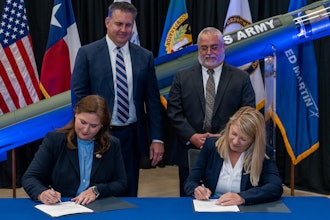DOHA, Qatar (AP) -- A senior official at an organization representing the majority of airlines worldwide said Tuesday there is no specific timetable for implementing new tracking recommendations following the disappearance of a Malaysian aircraft with 239 people aboard in March.
Discussions about real-time tracking and airline safety have featured in many sessions of the International Air Transport Association's annual meeting, held this year in the Gulf-Arab nation of Qatar. That's because passengers and even experts continue to wonder how an aircraft can just disappear without anyone knowing what went wrong.
Speaking at the conference, IATA's Safety and Flight Operations Senior Vice President Kevin Hiatt said it is hard to speculate at this moment how long it will take before the aviation industry implements the recommendations that will be presented by December.
"What's happened in this particular case is that we found a gap that we feel that we need to basically close when it comes to now being more aware of exactly where that aircraft would be in a real-time situation," he said.
He said changes to aircraft could be included during scheduled annual maintenance of planes, but also depend on how quickly equipment can be made available and if new aircraft on order can accommodate the recommended changes.
"You are looking at a period of time that's hard to speculate at this moment," Hiatt said. "Aircraft technology has outpaced air traffic technology and therefore what we're doing is making the best of the system that we got."
Another panel at the conference focused on aviation security and the tricky balance between government regulation and passenger rights.
U.S. Secretary of Homeland Security Jeh Johnson said that while he flies on government aircraft since assuming the job, he tried five months ago to fly again as a passenger and went through security just like anybody else.
The first impulse when a scare happens, Johnson said, is to think about prohibiting or prevent something. But Johnson stressed that there must be a balance between security and not disrupting lawful trade and travel.
"I look at the world situation and I recognize that we continue to need vigilance when it comes to aviation security," he said.
He said pre-clearance facilities, like the one recently opened in the United Arab Emirates' capital of Abu Dhabi, is an effective tool for screening people before they board. The U.S. has pre-clearance passenger facilities throughout Canada, in four Caribbean locations and Ireland as well. The new facilities allow passengers to complete U.S. customs and immigration checks before boarding flights to the U.S.
Brian Havel, the dean of international affairs at De Paul University's College of Law in Chicago, spoke alongside Johnson and called for "smart regulation," one that takes into consideration the commercial airline industry and passengers' needs more.
Havel said the U.S. "backs the regulatory gang," pointing to the increase in federal air marshals after the Sept. 11 attacks. He said the program costs $200 million a year to run and has led to just 50 arrests, none of them for terrorism-related offenses.
Online:
International Air Transport Association: www.iata.org






















